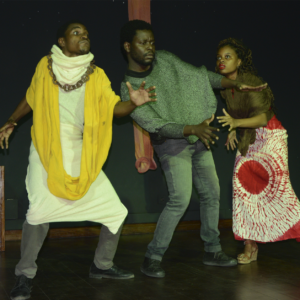Since launching our “Lusophone Takeover”, we have focussed mainly on the new and extraordinary pressures on theatre makers under COVID-19. We started in Brazil, then travelled to Portugal, and now we’re concluding this corona-inspired mini series by turning our gaze towards to Mozambique!
Rita Couto is a young producer and actress living in Mozambique, who is already responsible for several seriously interesting theatrical productions. She has been kind enough to answer a few of our questions and reflect on theatre in the wake of this global pandemic.
Could you please introduce yourself to our readers?
I’m Rita Couto and I worked for 5 years in a cultural space called Fernando Leite Couto Foundation. My focus has always been the production and programming of events. I founded the Cenas curtas (Short Scenes) theatre festival and produced for it several plays.
I am also an actress and musician, developing my projects on a personal basis or in collaboration with other artists.
Can you tell us a bit about that fantastic version of Antigone that you were involved in last year?
OK. So, let’s, for a moment, revisit the “good old days”…

Actors: Sidónio Mondlane, Horácio Guiamba and Milsa Ussene.
Antigone: lights and shadow (2019) was based on the Athenian tragedy, Antigone. Sophocles’ titular Theban princess, who in defiance of state law gave her brother a proper burial, has long been a symbol of female political activism. This 2019 production, coordinated by the Foundation Fernando Leite Couto, was adapted by António Cabrita, and the stage was set by Venâncio Calisto and me [Rita Couto]. The background of the production was the devastation that struck Mozambique (as well as Malawi, Madagascar and Zimbabwe) in the form of a severe tropical cyclone, triggering catastrophic damage and humanitarian crisis. Here is the synopsis of the play:
When Cyclone Idai hit his city, Nazir realised that the budget to stage a performance based on Antigone’s play was compromised. That same day he reduced the cast to three actors and made a drastically reduced version of Sophocles’ play, and from that “ruin” he set out to stage a dramatic exercise in art and resilience.
What questions can be asked in the midst of this apocalyptic scenario of shadow and wind? What lights can be questioned through the Antigone revolt?
Between life and death, natural law and the law of humans, who cries out for help above the trees?

How is the theatre in Mozambique facing the crisis posed by Corona virus?
Unfortunately, the theatre in Mozambique was already facing a crisis before the corona virus arrived. No doubt now the challenges have increased even more, and not only for the theatre, but for culture as a whole and for education too.
What remedies would I suggest? First of all, there must be more unity, creativity, openness and also more listening than exists in Mozambique today. The potential may already be here. Perhaps the existing situation is, in fact, better than it seems. For example, it is important to conduct a proper survey of artistic groups/associations/companies. We need to know exactly how many of these groups are producing in Mozambique. I think this survey could be the herald of progress. When we know what is out there, who are the agents are in the field, and where they come from, we will know how to support them.
In the current difficulties some allies have emerged. Some TV channels have broadcast small filmed sketches, in a simple way, almost like a theatrical play. With a lot of humour and lightness they pass messages about the corona, what to do etc… it is really interesting. Suddenly the virus itself has come to help and stimulate unlikely alliances… But they are very low-cost productions.
This is just one door that has opened, but it needs to be explored more fully. Television and radio should approach other partners, professionals in cinema, theatre, music, writing, in order to create more national productions. Nothing is easy: resources are scarce, money is needed for everything, and that is now an added difficulty. But hope cannot die.
In your activity as a theatrical producer, has it been possible to face new projects? What adjustments have you made?
Coincidentally, I had already decided to interrupt my work as a producer and devote myself more to personal artistic creation. But I witnessed the beginning of an adaptation, when we started at the Fernando Leite Couto Foundation, doing online events. Other houses and cultural institutions in Maputo have been doing similar things. But the system does not ensure wide communication in the country because unfortunately not everyone has access to the internet.
At least there is one advantage: today, anywhere in the world it is possible to watch online events held here in Mozambique. It was necessary to learn more about audiovisual production and to know how to adjust real time to the time of networks and cameras. Remote events will never be the same as live events; they lack the warmth of an audience. But they have offered an immediate solution.
Can you imagine that after this experience theatre will regain its former identity, or are other changes inevitable?
I believe there will be many changes. In general our behaviour will change and this will also affect the theatre. But the need to be close to one another and feel the chill in the live skin, in front of an exciting scene whether in the theatre, music or cinema… that, I think, will never die.
Rita Couto, Maputo, 14th July 2020
The future, no doubt, lies in the children. In the puppets is the seduction of new audiences.
Stay at home (#Fiqueemcasa), the theatre comes to you…





A Recepção dos Clássicos é um campo fértil que não cessa sua criação e reinvenção.
O que impressiona é como a adversidade produz criatividade!
E mais: a criatividade e a arte ajudam a vencer a adversidade.